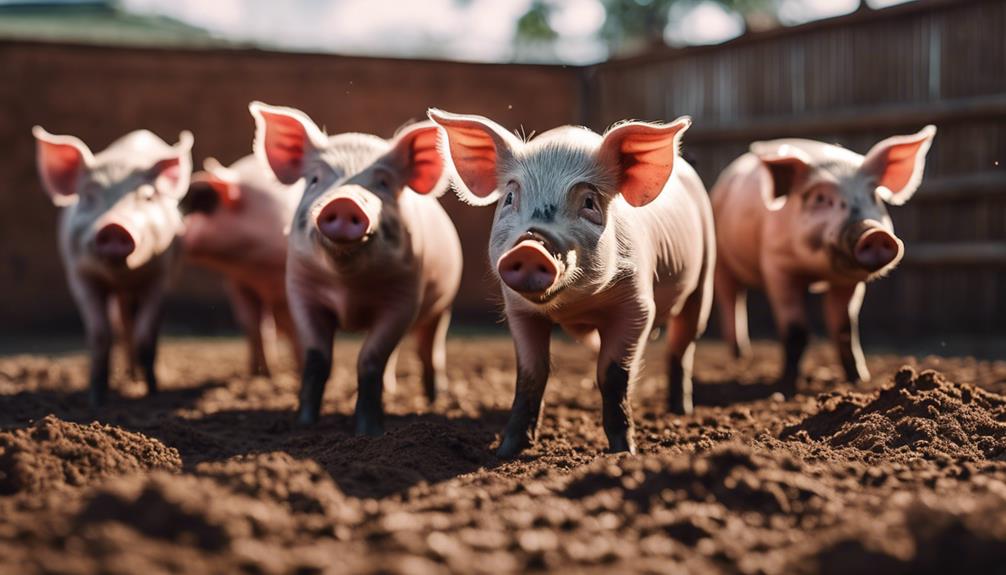Pigs can safely consume coffee grounds in moderation because of their beneficial nutrients. However, it is important to be cautious as coffee grounds contain caffeine, which can negatively affect pig health. Including up to 10% coffee grounds in their diet is generally considered safe, but exceeding this amount could have a detrimental impact on their growth and feed intake. It is crucial to avoid feeding pigs moldy coffee grounds as they may contain harmful toxins. Consult a veterinarian for safe feeding practices to ensure the well-being of your pigs. Before incorporating coffee grounds into their diet, consider these factors.
Key Takeaways
- Up to 10% inclusion of coffee grounds is generally safe for pigs.
- Monitoring pig behavior is crucial when feeding coffee grounds.
- Consult a vet before adding coffee grounds to pig diets.
- Avoid moldy or spoiled coffee grounds to prevent health issues.
- Caffeine in coffee grounds can disrupt pig reproduction.
Nutritional Benefits of Coffee Grounds for Pigs
Coffee grounds offer nutritional benefits to pigs due to their content of organic compounds like fatty acids, amino acids, polyphenols, minerals, and polysaccharides. While they may not greatly impact the growth rate of pigs, these compounds can still provide essential nutrients for overall health.
The inclusion of coffee grounds in pig rations up to 10% has been shown in studies not to adversely affect growth or carcass quality, indicating their potential as a supplemental feed source. The fiber content in spent coffee grounds, although variable, plays an important role in promoting gut health and aiding digestion in pigs.
It's important to note that while pigs can consume coffee grounds, they shouldn't be a primary source of nutrition as they can't eat them alone. Instead, when properly incorporated into a balanced diet, coffee grounds can contribute to the overall nutritional profile and well-being of pigs.
Considerations Before Feeding Coffee Grounds
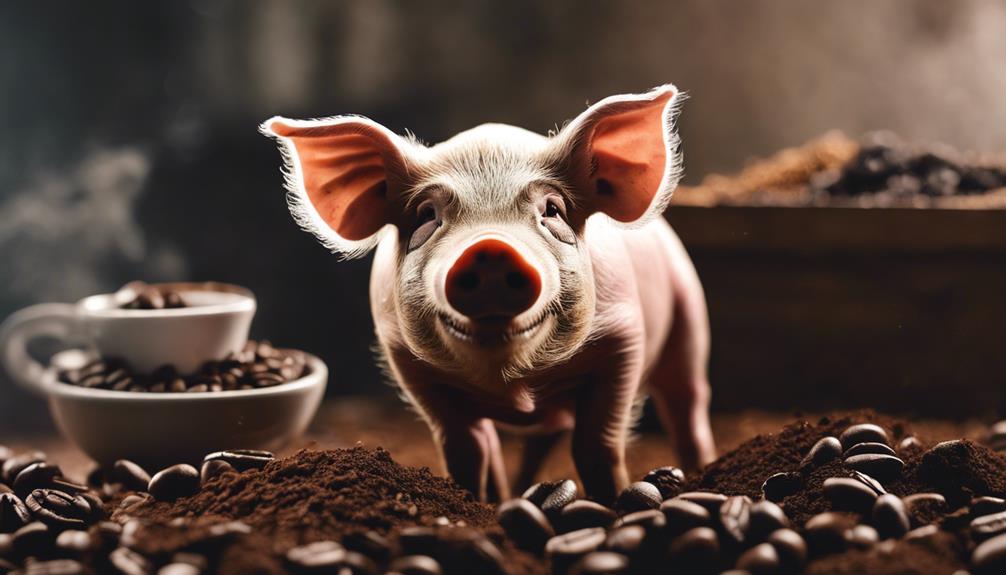
Before introducing coffee grounds into a pig's diet, it is essential to take into account several key factors to guarantee the well-being and peak health of the animals. One rule of thumb to remember is that pigs can't eat everything humans can, and coffee grounds fall into that category. When considering feeding finishing pigs coffee grounds, it's important to understand that these grounds contain caffeine, which can disrupt their reproductive abilities and potentially lead to porcine stress syndrome in susceptible individuals.
To further illustrate the considerations before feeding coffee grounds to pigs, the table below outlines key factors to keep in mind:
| Consideration | Importance |
|---|---|
| Caffeine content in coffee grounds | Can interfere with pig health and reproduction |
| Preference for other food sources | Pigs may find other foods more appetizing than coffee |
| Impact on feed intake and growth rates | Coffee grounds can lead to decreased growth in pigs |
| Health risks associated with caffeine | Avoid substances that may harm pig well-being |
| Consultation with a livestock vet | Seek professional advice for safe pig feeding options |
Moderation Is Key: Amount of Coffee Grounds
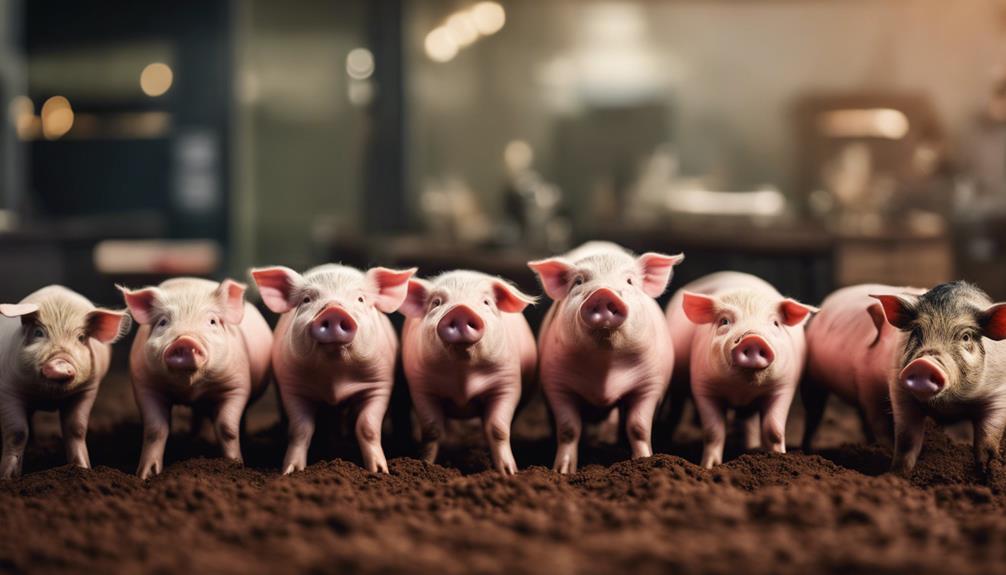
When it comes to feeding pigs coffee grounds, moderation is essential. Excessive amounts can pose risks to their health, affecting their feed intake and growth.
Monitoring your pigs' behavior and consulting a vet can help guarantee safe consumption levels.
Safe Consumption Levels
To guarantee the safety and health of pigs, it's essential to carefully regulate the amount of spent coffee grounds included in their diets. Keeping the consumption at a pivotal level is vital to ensure peak growth and overall well-being.
Here are some key points to contemplate:
- Feeding pigs up to 10% spent coffee grounds in their rations is deemed safe based on a study's findings.
- Increasing the level of coffee grounds to 15% in pig feed can lead to a significant reduction in daily weight gain and feed conversion efficiency.
- Spent coffee grounds have the potential to alter the nutrient composition of pig feed, impacting crude fiber and ether extract content.
- Despite potential changes in nutrient levels, adding coffee grounds didn't have a negative impact on the carcass quality of the pigs in the study.
Potential Health Risks
In considering the potential health risks associated with feeding pigs coffee grounds, moderation is key to safeguarding their well-being. While coffee grounds aren't inherently toxic to pigs, excessive consumption can lead to issues such as decreased feed intake and growth rate.
It's important to understand that pigs shouldn't be given large quantities of coffee grounds as it can impact their palatability and overall health. Studies have shown that including up to 10% of spent coffee grounds in pig rations is generally safe; however, higher levels can have adverse effects on their growth and well-being.
Hence, it's essential to exercise caution and moderation when incorporating coffee grounds into a pig's diet. To ensure the safety and appropriate feeding practices for pigs concerning coffee grounds, it's advisable to seek guidance from a livestock veterinarian.
Monitoring Pig Behavior
Observing pig behavior is essential for determining the safe amount of coffee grounds they can consume. When monitoring pig behavior in relation to coffee grounds consumption, consider the following:
- Palatability and Digestive Tolerance:
Watch how pigs react to coffee grounds to assess if they find it appetizing and if their digestive systems handle it well.
- Gradual Introduction:
Introduce small amounts of coffee grounds slowly into the pig's diet to observe any negative effects or changes in behavior over time.
- Preference Indicators:
Pigs may display preferences or aversions to coffee grounds, indicating whether they accept or reject this new addition to their feed.
- Optimal Inclusion Rate:
Careful observation of pig behavior helps in determining the right amount of coffee grounds to include in their diet for their safety and well-being.
Risks of Moldy or Spoiled Coffee Grounds
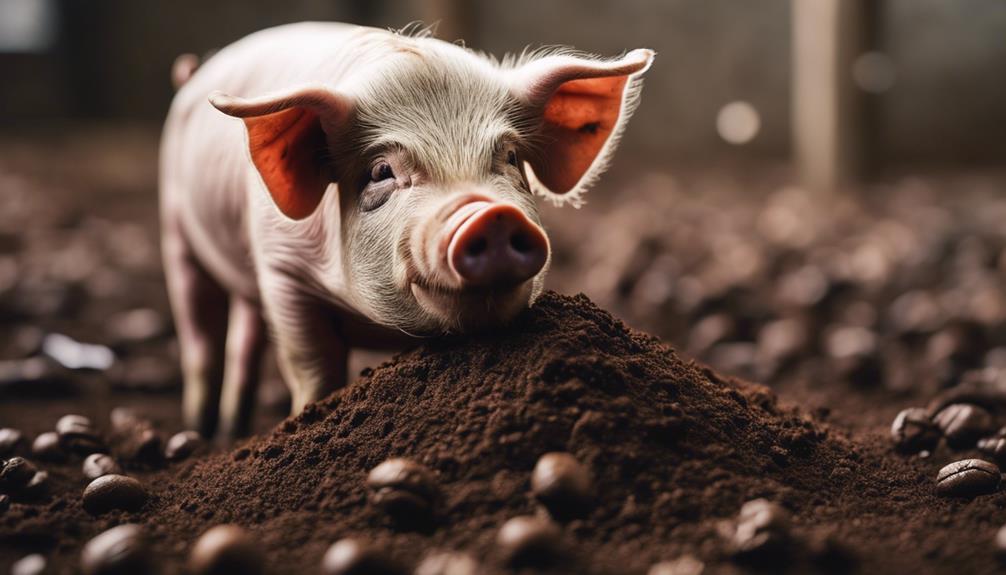
When coffee grounds become moldy or spoiled, they can pose risks to pigs due to the presence of harmful mycotoxins. Mycotoxins found in moldy coffee grounds have the potential to cause severe health issues in pigs, such as liver damage. It is important to understand the dangers associated with feeding pigs moldy or spoiled coffee grounds, as these toxins can have detrimental effects on their well-being. To prevent such risks, it is vital to guarantee proper storage and handling of coffee grounds to avoid mold growth and mycotoxin formation. Regularly inspecting coffee grounds for any signs of spoilage, particularly mold, is essential. If any mold is detected, it is important to discard the coffee grounds promptly to safeguard the health of your pigs. Below is a table outlining the risks associated with moldy or spoiled coffee grounds:
| Risks of Moldy or Spoiled Coffee Grounds |
|---|
| – Contain harmful mycotoxins |
| – Can lead to liver damage in pigs |
| – Avoid feeding pigs moldy grounds |
| – Proper storage prevents mycotoxin formation |
Consultation With Veterinarian or Nutritionist
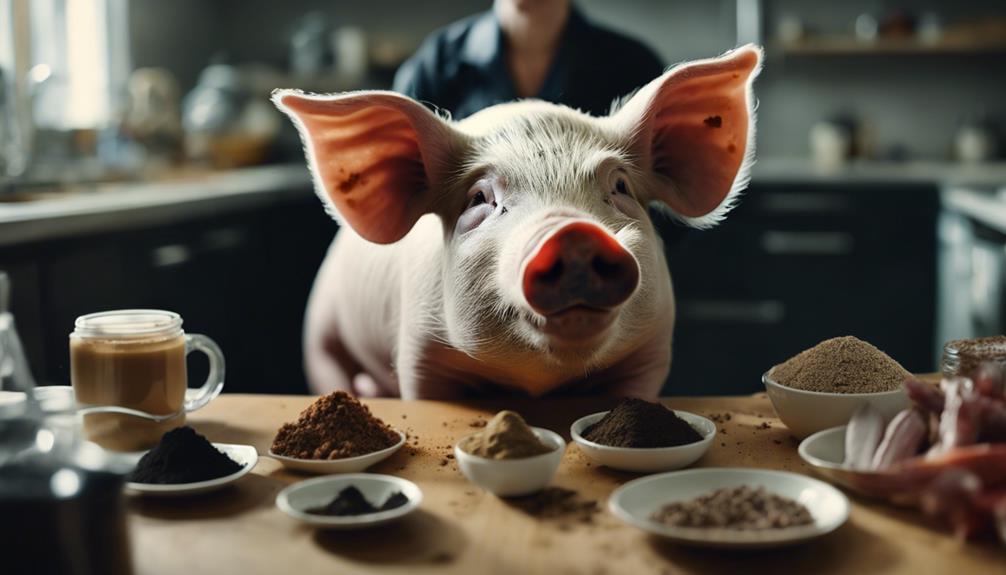
Before introducing coffee grounds into a pig's diet, it's essential to consult with a veterinarian or nutritionist. These experts can offer valuable insights into potential health risks and appropriate dietary choices for pigs.
Seeking professional guidance is vital for ensuring the well-being and nutritional needs of your animals.
Expert Advice Importance
Seeking guidance from a veterinarian or nutritionist is essential before introducing coffee grounds to a pig's diet to safeguard their health and well-being. These experts can provide tailored advice based on the specific needs and health conditions of the pigs. Here are some reasons why consulting with a professional is vital:
- Veterinarians can assess potential risks, such as caffeine content in coffee grounds, that may harm the pigs.
- Nutritionists can offer guidance on balanced diets and suitable alternatives to guarantee the pigs' well-being.
- Professional consultation helps prevent health issues and ensures the pigs receive adequate nutrition from their diet.
- Experts can provide insights into the overall impact of introducing coffee grounds, considering factors such as digestion and overall health of the pigs.
Health Considerations Crucial
Consulting with a veterinarian or nutritionist is essential to guarantee the health and well-being of pigs when considering introducing coffee grounds into their diet. Given the potential risks associated with caffeine intake, seeking professional advice is vital to avoid adverse health effects on the pigs. Veterinarians and nutritionists possess the expertise to assess the dietary needs of pigs and determine the suitability of incorporating coffee grounds based on their individual health conditions. Prioritizing the safety and welfare of the animals is paramount, making it imperative to consult with these professionals before making any dietary changes.
To emphasize the importance of seeking expert guidance, consider the following table:
| Reasons to Consult with a Veterinarian or Nutritionist |
|---|
| 1. Assess potential risks and health implications of coffee grounds. |
| 2. Tailor dietary recommendations based on the specific needs of the pigs. |
| 3. Ensure the overall health and well-being of the animals. |
| 4. Obtain professional advice to prevent any negative impacts on pig health. |
Professional Guidance Essential
Professional guidance from a veterinarian or nutritionist is crucial when considering introducing coffee grounds into pigs' diets to guarantee their health and well-being. Seeking expert advice can prevent health issues like porcine stress syndrome and ensure the best nutrition for pigs.
When consulting with a veterinarian or nutritionist regarding feeding pigs coffee grounds, consider the following:
- Evaluate potential health risks associated with coffee grounds in pig diets.
- Assess the suitability of coffee grounds based on individual pig health and nutritional requirements.
- Obtain insights on safe feeding practices and possible alternatives to coffee grounds.
- Receive tailored advice on balancing pig diets with essential nutrients while avoiding harmful substances.
Digestive Impact of Coffee Grounds on Pigs
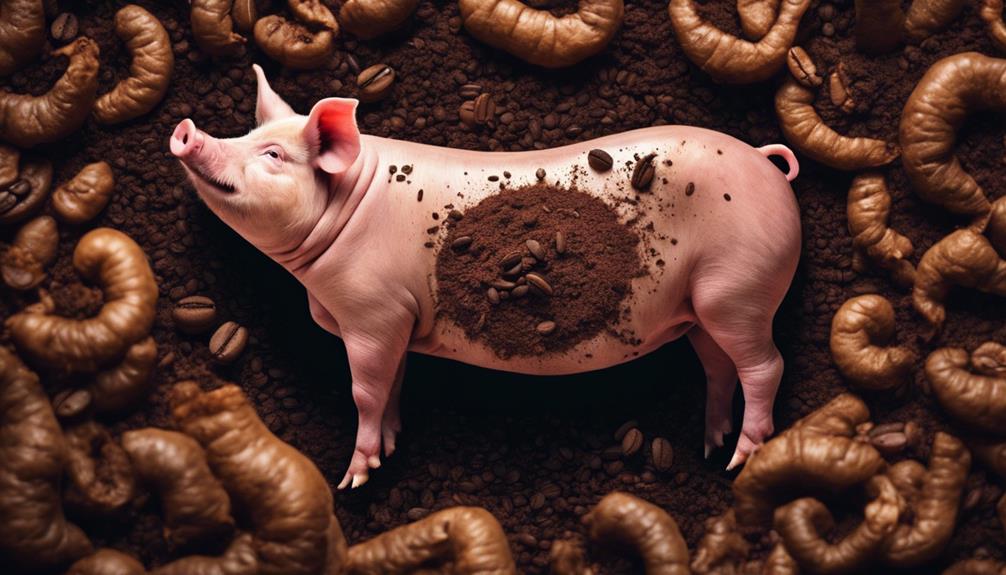
Feeding pigs coffee grounds can have a significant impact on their digestive system, leading to decreased feed intake and growth rates. Research conducted with Yorkshire breed pigs revealed that including spent coffee grounds at a 15% level significantly reduced daily live weight gain and feed conversion efficiency.
Pigs mightn't find coffee grounds as appealing as other food sources like fruits, vegetables, and grains. This unappetizing aspect could further contribute to the decline in feed intake and growth rates when coffee grounds are included in their diet.
Additionally, the caffeine content present in coffee grounds can disrupt a pig's reproductive ability and potentially trigger porcine stress syndrome (PPS), particularly in susceptible pigs.
To maintain the health and growth of your pigs, it's advisable to steer clear of feeding them coffee grounds and to seek guidance from a livestock veterinarian for safe and suitable feeding alternatives.
Caffeine Levels in Coffee Grounds
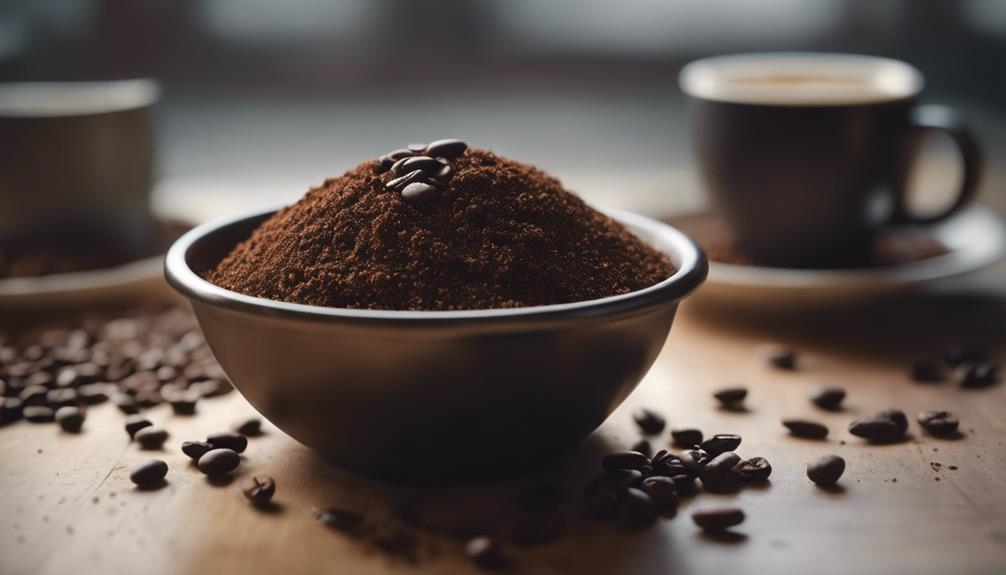
Coffee grounds contain varying levels of caffeine, which can pose health risks to pigs if included in their diet. Here are some essential facts about caffeine levels in coffee grounds:
- The caffeine content in coffee grounds can differ based on factors such as the type of beans used and the brewing method employed.
- Caffeine found in coffee grounds has been linked to negative effects on pigs' reproductive abilities and can contribute to porcine stress syndrome (PPS).
- It's highly recommended against feeding coffee grounds to pigs due to the potential health hazards associated with caffeine consumption.
- Seeking guidance from a livestock veterinarian is vital to explore safe feeding alternatives for pigs and prevent caffeine-related health issues. Remember, it's always best to err on the side of caution and avoid feeding pigs substances like coffee grounds that contain caffeine to safeguard their well-being.
Other Foods to Avoid Feeding Pigs
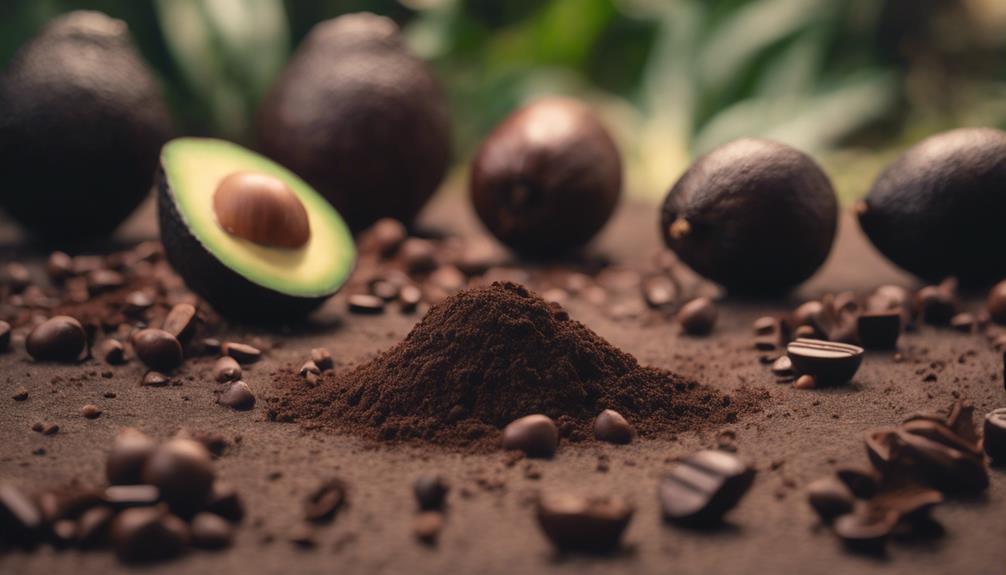
Avoid feeding pigs certain foods like nutmeg, raw bread dough, chocolate, bones, fatty foods, and sugary treats to prevent potential health issues. Nutmeg can cause upset stomachs, while raw bread dough can lead to gastric distention and metabolic acidosis. Chocolate is harmful to pigs, bones can splinter and cause lacerations, and fatty foods can result in pancreatitis. Pigs should steer clear of sugary foods to prevent obesity.
While pigs can digest chocolate, it shouldn't be intentionally given to them. Fatty foods can lead to pancreatitis and other health issues in pigs. It's essential to be mindful of what you feed your pigs to safeguard their well-being. Opt for a balanced diet that meets their nutritional needs without including foods that could harm them.
Final Thoughts on Feeding Coffee Grounds
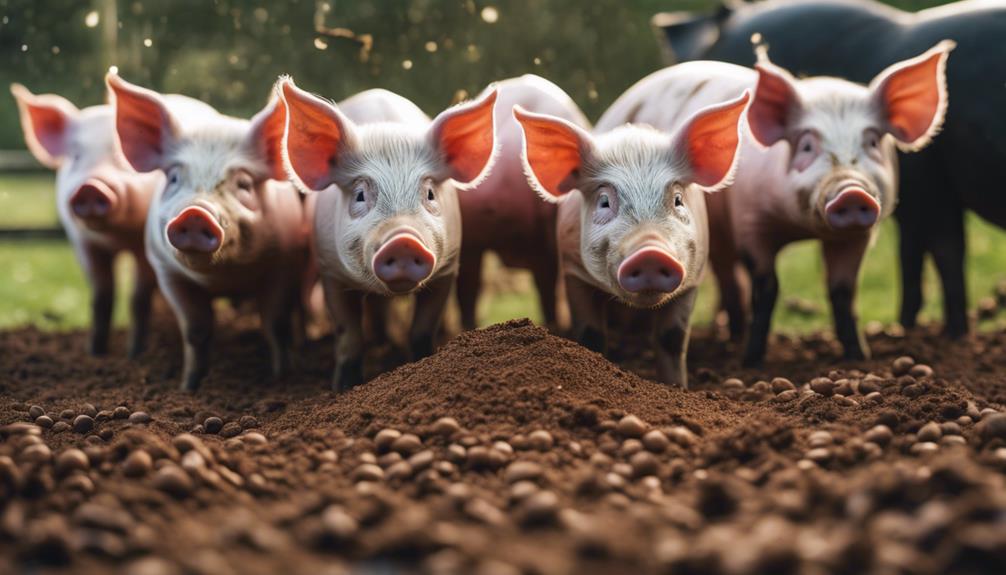
To guarantee the health and well-being of your pigs, it's essential to understand the risks associated with introducing coffee grounds into their diet. Feeding coffee grounds to pigs isn't recommended due to potential health risks linked to caffeine consumption. Coffee grounds may contain substances that can lead to porcine stress syndrome (PPS) in susceptible pigs.
It's best to stick to a balanced pig feed diet to ensure peak health and growth. Consulting a livestock veterinarian for advice on safe and suitable pig feeding options is highly recommended. Additionally, it's vital to avoid feeding pigs foods that are known to be toxic or harmful to their health.
Frequently Asked Questions
Can You Feed Pigs Coffee Grounds?
You shouldn't feed pigs coffee grounds as it can harm their reproductive ability and lead to porcine stress syndrome. To guarantee the well-being of your pigs, consult a livestock vet for safe feeding options.
Stick to appropriate pig feed and avoid substances that may pose health risks. Research safe foods to prevent any complications that could affect the health of your pigs.
Prioritize their health and well-being by making informed feeding choices.
What Should You Not Feed a Pig?
When considering what not to feed a pig, it's essential to avoid harmful substances that can jeopardize their health. Items like nutmeg, raw bread dough, chocolate, bones, fatty foods, and sugary treats should be off the menu.
Just as you prioritize your well-being by selecting nourishing foods, extend the same care to your pig's diet. Consult a veterinarian to make sure you're providing safe and healthy feeding options tailored to their specific needs.
Are There Any Foods Toxic to Pigs?
Foods toxic to pigs include nutmeg, raw bread dough, chocolate, bones, fatty foods, and high-sugar items. Nutmeg can cause stomach upset, while raw dough leads to gastric issues.
Chocolate is harmful, bones can splinter, fatty foods cause pancreatitis, and sugar can lead to obesity. While pigs can digest chocolate, intentional feeding is discouraged. Consulting a vet if ingestion occurs is advised.
Be cautious and well-versed about what you feed pigs to safeguard their well-being.
Why Can't Pigs Eat Grass?
Pigs can't eat grass efficiently due to lacking the necessary enzymes for cellulose digestion. Their simple stomach makes breaking down grass challenging, unlike ruminants.
Grass, high in fiber, can't provide pigs the essential nutrients for growth. Opt for a diet rich in grains and proteins to meet their nutritional needs.
Grass may not suffice, hindering proper development and health for these animals.
Conclusion
To wrap up, while coffee grounds can offer some nutritional benefits for pigs, it's important to proceed with caution. Moderation is key, as excessive amounts can be harmful.
Consultation with a veterinarian or nutritionist is recommended to guarantee the safe feeding of coffee grounds to pigs. It is important to consider the potential risks and benefits of incorporating coffee grounds into a pig’s diet, as well as the appropriate dosage. Additionally, consulting with a professional can help ensure that the coffee grounds are sourced responsibly and do not contain any harmful contaminants.
Furthermore, it is worth noting that while coffee grounds are commonly used as a natural remedy for repelling pests, such as roaches, it is important to use this method cautiously and in conjunction with other pest control measures. Does coffee repel roaches? Yes, it can be effective, but it is not a foolproof solution and should be used in conjunction with proper sanitation and professional pest control methods.
Remember, when it comes to feeding your pigs, always prioritize their health and well-being above all else.
